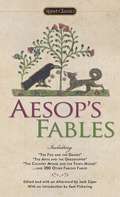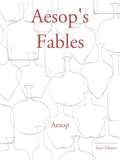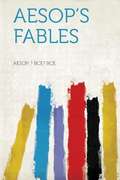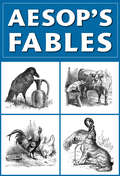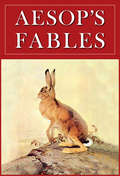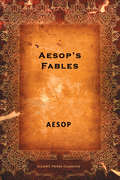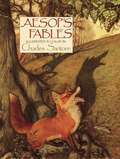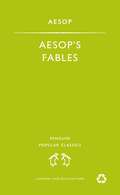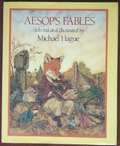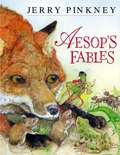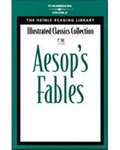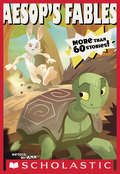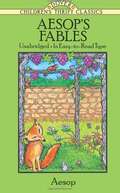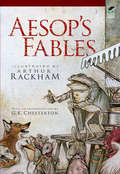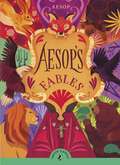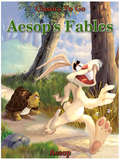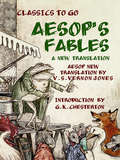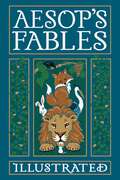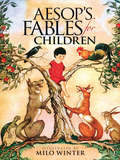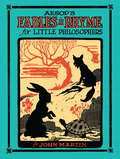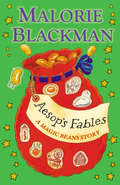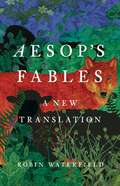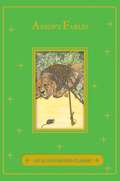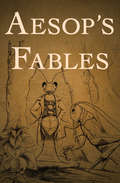- Table View
- List View
Aesop's Fables
by Aesop Jack Zipes Sam Pickering"Kindness is seldom wasted." --from "The Lion and the Mouse" It is both amazing and wonderful that so much of the richness of our language and our moral education still owes a huge debt to a Greek slave who was executed more than two thousand years ago. Yet "sour grapes," "crying 'wolf,'" "actions speak louder than words," "honesty is the best policy," and literally hundreds of other metaphors, axioms, and ideas that are now woven into the very fabric of Western culture all came from Aesop's Fables. An extraordinary storyteller who used cunning foxes, surly dogs, clever mice, fearsome lions, and foolish humans to describe the reality of a harsh world, Aesop created narratives that are appealing, funny, politically astute, and profoundly true. And Aesop's truth--often summed up in the pithy "moral of the story"--retains an awesome power to affect us, reaching us through both our intellects and our hearts. This exclusive Signet Classic edition contains 203 of Aesop's most enduring and popular fables, translated into readable, modern American English and beautifully illustrated with classic woodcuts by the great French artist J. J. Grandville. Includes: "The Fox and the Grapes" "The Ants and the Grasshopper" "The Country Mouse and the Town Mouse" Edited and with an Afterword by Jack Zipes With an Introduction by Sam Pickering
Aesop's Fables
by AesopA collection of fables credited to Aesop, a slave and story-teller believed to have lived in ancient Greece between 620 and 560 BCE.
Aesop's Fables
by AesopAESOP'S Fables is a collection of tales from the Greek story teller, Aesop. Most of the characters in his stories are animals, some of which take on human characteristic and are personified in ways of speech and emotions. Each fable has an accompanying moral to be learned from the tale.
Aesop's Fables
by AesopIt is believed that Aesop was a slave who lived in ancient Greece between 620 and 560 B.C. This illustrated collection contains 110 of his celebrated fables.
Aesop's Fables
by AesopIt is believed that Aesop was a slave who lived in ancient Greece between 620 and 560 B.C. This illustrated collection contains 110 of his celebrated fables.
Aesop's Fables
by Aesop Arthur Rackham V. S. Vernon JonesAesop's Fables is a collection of instructive short stories, typically ending with a moral lesson. Some fables, such as "The Fox and the Crow" or "The North Wind and the Sun", have been popular for centuries.
Aesop's Fables
by Aesop Charles SantoreHere are the time-honored fables of Aesop as never seen before. Santore's animals leap off the page in explosions of color, giving messages to ponder and physical beauty to savor. School Library Journal called this interpretation of the classic morality tales " a delight to the eye and ear. "
Aesop's Fables
by AesopThis striking new interpretation of the classic, with its delightful, quirky illustrations, brings the moral tales of Aesop to life for young readers More than a dozen of Aesop&’s fables are brought to dazzling new light in this exquisite edition by Ayano Imai. Including fables such as &“The Kid and the Wolf,&” &“The Ox and the Frog,&” and &“The Fox and the Grapes,&” among others, the tales are each given a unique charm through the superb illustrations.
Aesop's Fables
by AesopSardonic, wry and wise, Aesop’s Fables are some of the most enduring and well-loved literary creations in history. In a series of pithy, amusing vignettes, Aesop created a vivid cast of characters to demonstrate different aspects of human nature. Here we see a wily fox outwitted by a quick-thinking cicada, a tortoise triumphing over a self-confident hare and a fable-teller named Aesop silencing those who mock him. Each jewel-like fable provides a warning about the consequences of wrong-doing, as well as offering a glimpse into the everyday lives of Ancient Greeks.
Aesop's Fables
by Michael Hague Aesop AesopThe noted illustrator presents thirteen of Aesop's most familiar fables.
Aesop's Fables
by Jerry PinkneyIn this elegantly designed volume, more than sixty of Aesop's timeless fables have been carefully selected, humorously retold, and brought gloriously to life by four-time Caldecott Honor-winner Jerry Pinkney. Included are the Shepherd Boy and The Wolf, the Lion and the Mouse, the Tortoise and the Hare, plus many other characters and morals that have inspired countless readers for centuries.
Aesop's Fables
by S. A. HandfordAn illustrated collection of twenty-four Aesop fables selected from those populated only by animals, arranged in categories such as lion fables, fox fables, and wolf fables.
Aesop's Fables (Apple Classics Ser.)
by Ann Mcgovern Ricardo TercioAesop's fables are retold in kid-friendly text with black-and-white illustrations throughout! This 80-page edition of AESOP'S FABLES introduces young readers to Aesop's classic fables in a fun and accessible way. Ann McGovern retells the classic fables using kid-friendly language, and there are striking black-and-white illustrations throughout.
Aesop's Fables (Children's Thrift Classics)
by S. A. Handford Aesop Aesop Pat Ronson StewartWhile scholars are uncertain about the identity of Aesop or whether he was even an actual person, there is no doubt that the stories originally collected under his name over 2,000 years ago in Greece are among the world's most beloved tales. Combining a moral lesson with an entertaining story, the fables still retain their power to charm and instruct. <p><p> This delightful collection includes a selection of familiar favorites, including "The Fox and the Grapes," "The Ants and the Grasshopper," "The Town Mouse and the Country Mouse," "The Crow and the Pitcher," "The Lion and the Mouse," "The Dog and His Shadow," "The Wolf and the Kid," "The Fox and the Stork," "The Hare and the Tortoise," "The Maid and the Pail of Milk," "The Boy Who Cried Wolf" and dozens more. <p><p> Reset in large, easy-to-read type and accompanied by 35 original illustrations by Pat Stewart, Aesop's Fables is ready to enchant and edify a new generation of readers.
Aesop's Fables (Dover Children's Classics)
by G. K. Chesterton Arthur Rackham V. S. JonesBeware of wolves in sheep's clothing, and don't kill the goose that lays the golden eggs! These simple allegories — abounding in paradoxes, ambiguities, and ironies — embody great truths. Attributed to a legendary storyteller of ancient Greece, they speak to readers and listeners of all ages and cultures.This enchanting edition of Aesop's morality tales features illustrations by Arthur Rackham. His thirteen full-color and fifty-three black-and-white images lend a perfect blend of humor and romanticism to the timeless fables. An illuminating Introduction by G. K. Chesterton complements V. S. Vernon Jones's sprightly, concise, and idiomatic translation.
Aesop's Fables (Puffin Classics)
by AesopThe original Aesop Fables, introduced by award-winning author Marcus Sedgwick.Over two hundred familiar tales from 'Look Before You Leap' and 'The Boy Who Cried Wolf' to much less familiar tales, each with its own sharply pointed moral.Puffin Classics come with additional end material including author profile, things to think about and do, a glossary, and more.
Aesop's Fables - Translated by George Fyler Townsend: Translated By George Fyler Townsend (1887). Illustrated By Harrison Weir, John Tenniel, Ernest Griset And Others (Classics To Go)
by AesopAesop's Fables is a collection of fables credited to Aesop, a slave and story-teller believed to have lived in ancient Greece between 620 and 560 BCE. Of diverse origins, the stories associated with Aesop's name have descended to modern times through a number of sources. They continue to be reinterpreted in different verbal registers and in popular as well as artistic mediums.
Aesop's Fables A New Translation by V. S. Vernon Jones Introduction by G. K. Chesterton (Classics To Go)
by G. K. Chesterton V. S. Vernon JonesExcerpt: "A hungry Fox saw some fine bunches of Grapes hanging from a vine that was trained along a high trellis, and did his best to reach them by jumping as high as he could into the air. But it was all in vain, for they were just out of reach: so he gave up trying, and walked away with an air of dignity and unconcern, remarking, "I thought those Grapes were ripe, but I see now they are quite sour.""
Aesop's Fables Illustrated: Amazing Animal Tales For Little Children (Leather-bound Classics #No. 4)
by AesopThis illustrated collection includes hundreds of fables that have influenced our world for centuries.The stories attributed to Aesop, a slave and storyteller who lived in Greece around 620–564 BCE, were originally passed on through oral tradition before first being transcribed several centuries after his death. Many of these fables use animals as the main characters to convey deeper meanings and morals that have become ingrained in our cultural and personal belief systems. This elegant leather-bound volume includes 488 fables, along with more than 100 illustrations by celebrated artists Arthur Rackham and Walter Crane. A scholarly introduction examines Aesop&’s life and the oral tradition, providing readers with further insight into the world of the humble storyteller whose presence continues to touch us today.
Aesop's Fables for Children
by Milo WinterFor centuries, children and adults have treasured the stories handed down by Aesop, a slave who lived in ancient Greece approximately six centuries B.C. Known for their charm and simplicity, these simple tales feature brief adventures of animals, birds, and beasts -- with a message hidden in each narrative. Every child should meet up with "The Hare and the Tortoise," "The Ants and the Grasshopper," "The Goose and the Golden Egg," "The Wolf in Sheep's Clothing," and other characters. This splendid gift edition features more than 130 of Aesop's beloved fables, enhanced with full-color illustrations.
Aesop's Fables in Rhyme for Little Philosophers
by John Martin George Leonard Carlson W. Fletcher WhiteAs generations have learned from these ancient animal stories, fine feathers don't necessarily make fine birds, slow and steady helps win the race, and it's a mistake to count your chickens before they're hatched. Twenty-four timeless fables, recounted in verse, are complemented by distinctive wood engravings featuring black-and-red silhouettes of the legendary creatures.Readers of all ages will delight in tales of the lordly lion whose generosity is repaid by a tiny mouse, the miser who destroys his own good fortune by killing the goose that laid golden eggs, and the greedy dog who loses his ill-gotten gains because he's jealous of his own reflection. Many of the fables are accompanied by charming poems that note the healing power of song, the futility of quarrels, the worth of kindly deeds, and other sage advice.
Aesop's Fables: A Magic Beans Story
by Malorie BlackmanA singing ant, a silly wolf and a mighty mouse are just some of the characters in this mini collection of everyone's favourite fables. After all, it's never too late to learn a new moral or two!This story is a magic bean. It may not look much like a bean, but I can promise you that it is. For if you plant it in a young mind, it will grow into a love of story and reading. These beans are favourite fairytales and legends that will delight, thrill and thoroughly entertain. Each story has been brilliantly crafted by one of the best-loved writers for children. This story was published by David Fickling Books as part of the Magic Beans anthology. The complete anthology is available in hardback and in ebook format.
Aesop's Fables: A New Translation
by AesopFrom a renowned scholar and translator, the definitive translation of Aesop&’s Fables Aesop&’s fables are among the most familiar and best-loved stories in the world. Tales like &“The Tortoise and the Hare,&” &“The Dog in the Manger,&” and &“Sour Grapes&” have captivated us for generations. The fables delight us and teach timeless truths. Aesop&’s tales offer us a world fundamentally simpler to ours—one with clear good and plain evil—but nonetheless one that is marked by political nuance and literary complexity. Newly translated and annotated by renowned scholar Robin Waterfield, this definitive translation shines a new light on four hundred of Aesop&’s most enduring fables.
Aesop's Fables: An Illustrated Classic (An Illustrated Classic)
by Aesop J. Emmerson Percy J. BillinghurstAn illustrated collection of charming stories to entertain all agesAesop is credited with many fables that have endured for centuries, relating morals and truth to young and old using animals as the main characters in each story. This collection of 100 tales, with color illustrations and black-and-white art by Percy J. Billinghurst throughout, is a beautiful addition to any home library. The cloth-bound cover with a full-color illustrated plate and foil stamping will stand out as a special piece, and you can add other titles in the series to complete a treasury worthy of handing down to your grandchildren.
Aesop's Fables: Classic Children's Stories By Aesop (Classic Bks.)
by AesopTimeless tales of inspiration and enlightenment In ancient Greece, a storyteller named Aesop captivated his listeners with tales both beautiful and instructive. Thousands of years later, his fables—from &“The Ant and the Grasshopper&” to &“The Boy Who Cried Wolf&” to &“The Goose That Laid the Golden Egg&” to &“The Tortoise and the Hare&”—have lost none of their power to guide and entertain. This ebook has been professionally proofread to ensure accuracy and readability on all devices.
